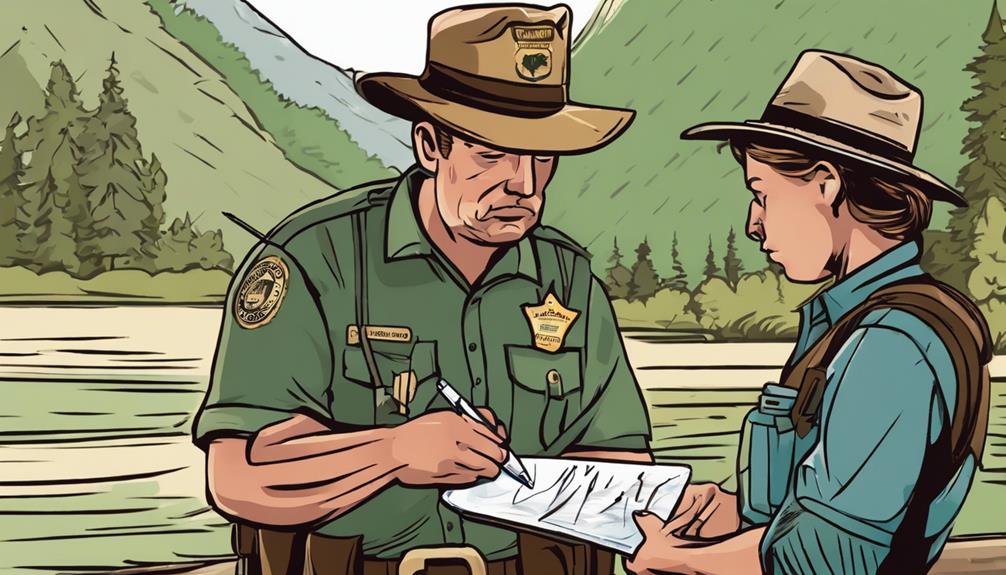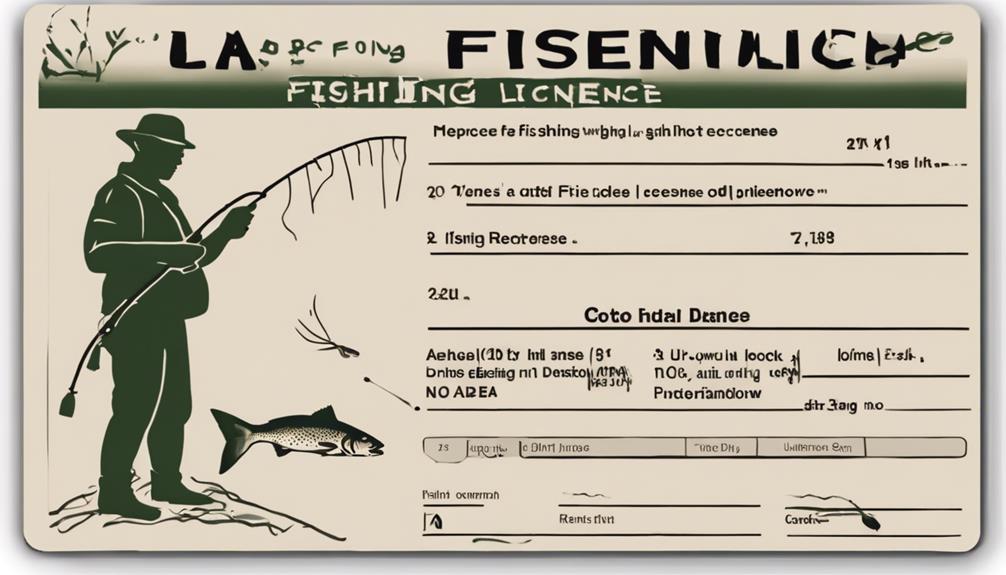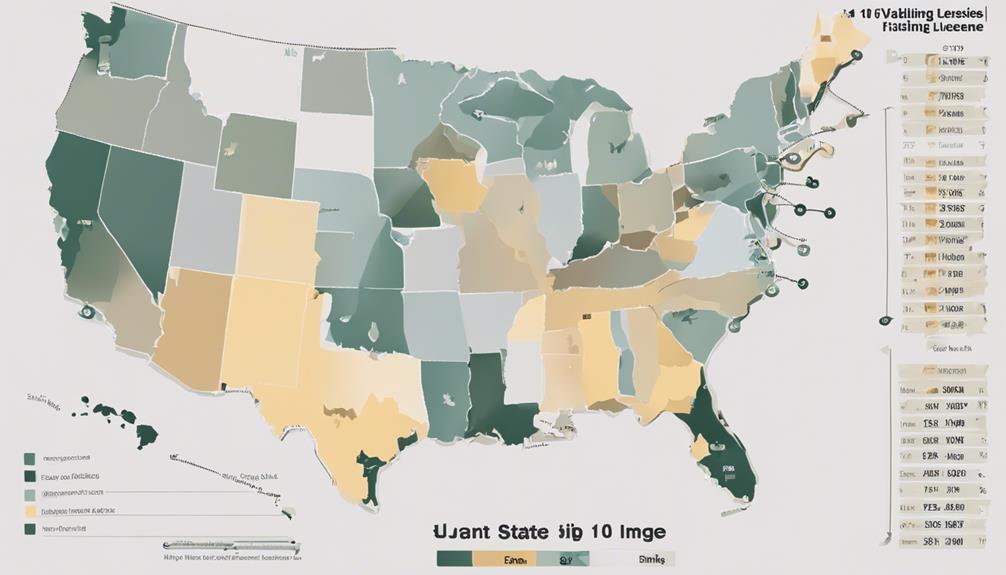When it comes to ensuring a hassle-free fishing experience, knowing the ins and outs of fishing regulations can mean the difference between a successful outing and facing hefty penalties.
However, even with the best intentions, it's easy to unknowingly fall foul of fishing license violations.
But fear not, by following six simple yet crucial tips, you can navigate the murky waters of fishing regulations with confidence and avoid potential repercussions.
So, let's dive into these tips to safeguard your fishing adventures and ensure a smooth sailing experience.
Understanding Fishing License Requirements
To avoid fishing license violations, make sure you understand the specific requirements for obtaining and carrying a valid fishing license in your state. Understanding regulations is crucial to ensure you comply with the law. Different states have varying rules regarding fishing licenses, including different license types such as freshwater, saltwater, or combination licenses. It's essential to familiarize yourself with these regulations to avoid any potential violations.
Each state has its own set of regulations governing fishing activities, including license requirements. Some states may have specific age restrictions for obtaining a fishing license, while others may require individuals to complete a fishing education course before being eligible for a license. Understanding these regulations will help you determine the type of license you need to legally fish in your state's waters.
Moreover, familiarize yourself with the different license types available. Depending on your fishing preferences, you may need a freshwater license to fish in rivers and lakes or a saltwater license for coastal fishing. Some states offer combination licenses that cover both freshwater and saltwater fishing. By knowing the various license types and their respective regulations, you can ensure you have the appropriate permit when engaging in fishing activities.
Checking License Validity Dates
Ensure you always check the validity dates of your fishing license to avoid any violations. Checking expiration dates is crucial to stay in compliance with license regulations. Fishing licenses typically have an expiration date printed on them, so make it a habit to review this information before heading out to fish. Ignoring or overlooking the expiration date can lead to hefty fines or penalties if caught by officials during a fishing trip.
To prevent any issues, mark your license expiration date on your calendar or set a reminder on your phone. It's easy to forget about the validity period of your license, especially if you obtained it months ago. By staying organized and proactive, you can ensure your license is always up-to-date.
Remember that license regulations vary by location, so it's essential to familiarize yourself with the specific rules in your area. Some regions may require annual renewals, while others offer licenses that are valid for a longer duration. Understanding these nuances will help you avoid unintentional violations and keep your fishing experiences stress-free.
Always double-check your license expiration date before each fishing trip, and if needed, promptly renew it to avoid any unnecessary penalties. Being proactive and responsible about checking your license validity dates is a simple yet effective way to ensure you stay within the bounds of the law while enjoying your time fishing.
Adhering to Catch Limits
When fishing, always be mindful of the catch limits set by regulations to avoid violations. It's crucial to know the legal limits for the species you're targeting in the area where you're fishing. Exceeding these limits can result in severe penalties, including fines, confiscation of equipment, or even suspension of your fishing license. To avoid penalties, educate yourself on the specific catch limits for the waters you plan to fish in.
One common mistake that leads to violations isn't accurately identifying the fish species and their corresponding size and bag limits. Make sure you can correctly identify the fish you catch and release any that are undersized or exceed the legal limits. Remember, ignorance of the law isn't an excuse, so take the time to familiarize yourself with the regulations before you cast your line.
Additionally, keep track of the number of fish you have caught to ensure you stay within the legal limits. It's easy to get caught up in the excitement of a successful fishing trip, but exceeding the catch limits can have serious consequences. By adhering to catch limits, you not only avoid penalties but also contribute to the conservation of fish populations for future generations to enjoy.
Renewing Licenses on Time
Keep your fishing experiences hassle-free by staying on top of renewing your fishing license on time. Timely renewals are crucial to ensure you can continue enjoying your favorite pastime without facing any penalties. Forgetting to renew your license can lead to fines or even the suspension of your fishing privileges, putting a damper on your outdoor adventures.
To avoid penalties, mark your calendar with your license expiration date and set a reminder well in advance. Many states offer online renewal options, making it convenient to update your license from the comfort of your home. By taking advantage of these online services, you can quickly renew your license without any unnecessary delays.
Remember that fishing license regulations vary by state, so it's essential to familiarize yourself with the specific renewal requirements in your area. Some states may offer auto-renewal services, ensuring you never miss a deadline. However, it's always wise to double-check your license status periodically to guarantee it remains valid.
Properly Displaying Licenses
To avoid potential fines or penalties, always prominently display your fishing license while engaging in fishing activities. Proper identification is crucial when out on the water, so make sure your license is visible and easily accessible at all times. The last thing you want is to be caught without proper documentation, leading to unwanted consequences.
License placement is key to ensuring compliance with fishing regulations. The best practice is to attach your license securely to your clothing or gear, such as a vest or tackle box, where it can be readily seen by authorities. Avoid placing it in a bag or tucked away in a pocket, as this can make it harder to verify your credentials if approached by enforcement officers.
Knowing Restricted Areas
Be aware of restricted areas while fishing to ensure compliance with regulations and avoid potential violations. Fishing boundaries are in place for a reason, and it's essential to respect them to protect the environment and fish populations. Ignoring these boundaries can lead to severe penalties, including fines or even the suspension of your fishing license.
Restricted areas can include marine protected areas, spawning grounds, and private properties where fishing is prohibited. Before casting your line, familiarize yourself with the specific rules and boundaries of the area you plan to fish in. Many bodies of water have different regulations, so it's crucial to stay informed to avoid unintentional violations.
When on the water, pay attention to signs, buoys, and markers that indicate restricted areas. These visual cues are there to help you identify where fishing isn't allowed. It's your responsibility to adhere to these boundaries and prevent any accidental intrusions into restricted zones.
If you're unsure about whether an area is restricted or not, don't hesitate to consult local authorities or fishery management organizations. They can provide you with the necessary information to ensure you stay within the legal fishing boundaries. Remember, ignorance of the rules isn't an excuse, so always take the time to know and respect the restricted areas while enjoying your time on the water.
Reporting Stolen Licenses Promptly

Respecting fishing boundaries is crucial, and another important aspect of maintaining compliance with regulations is promptly reporting stolen licenses. If your fishing license has been stolen or misplaced, prompt reporting is key to avoiding any potential violations. As soon as you realize your license is missing, take immediate action to report it to the relevant authorities.
Prompt reporting of a stolen license is vital for several reasons. Firstly, it helps protect you from being held accountable for any misuse of your license by someone else. By reporting the theft promptly, you demonstrate your commitment to following the rules and regulations set forth by the fishing authorities. Additionally, reporting the stolen license allows for the initiation of the process for a license replacement.
When reporting a stolen license, provide as much detail as possible about the circumstances of the theft. Include information such as where and when the theft occurred, any relevant identifying details about the license, and any other pertinent information that may assist in the investigation. By cooperating fully with the authorities, you not only protect yourself from potential penalties but also help maintain the integrity of the fishing licensing system.
Seeking Clarification From Authorities
If you have any uncertainties about fishing regulations, consider seeking clarification from the relevant authorities. Authority communication is crucial to ensure you're complying with all the necessary rules and regulations. Avoiding misunderstandings can prevent unintentional violations and hefty penalties. Proper inquiry is key to understanding the specific fishing requirements in your area.
When seeking clarification from authorities, make sure to reach out to the appropriate agencies responsible for regulating fishing activities in your location. This could include state fish and wildlife departments, local conservation offices, or relevant law enforcement agencies. These entities can provide you with accurate and up-to-date information regarding fishing licenses, catch limits, restricted areas, and any other regulations you need to be aware of.
Before heading out to fish, take the time to review the rules and regulations provided by the authorities. If you come across any unclear or conflicting information, don't hesitate to contact the relevant agencies for clarification. It's better to be safe than sorry when it comes to following fishing regulations. By seeking clarification from the authorities and ensuring you have a clear understanding of the rules, you can enjoy your fishing experience without the risk of violating any laws.
Frequently Asked Questions
Can You Transfer a Fishing License to Someone Else if You Are Unable to Use It?
If you can't use your fishing license, you usually can't transfer it to someone else. It's important to check the rules in your area.
Reimbursement options might be available in some cases instead of transferability. Make sure to contact the issuing agency or check their website for specific details on what's allowed.
Are There Any Special Requirements or Restrictions for Fishing in Certain Bodies of Water, Such as Private Ponds or Lakes?
When fishing in private lakes, you must abide by specific regulations set by the landowner. These rules may include restrictions on the type of fish you can catch, catch limits, and even the use of bait.
Make sure you have the necessary fishing license for that particular body of water, as some private lakes have additional restrictions that require a special permit.
Always respect the rules to avoid any penalties.
What Should You Do if You Accidentally Catch a Fish That Is Not Within the Legal Size or Species Limits?
If you accidentally catch a fish outside legal limits, handle the mishap by apologizing sincerely. Learn the regulations to avoid fines.
Contact the proper authorities to report the incident and seek guidance on the best course of action. Taking responsibility and showing respect for fishing rules can help mitigate any potential penalties.
Are There Any Penalties for Using Outdated or Expired Fishing Equipment While Fishing?
If you're using outdated or expired fishing equipment, there can be penalties. Make sure you stay up to date with tackle maintenance and inspection to avoid any issues.
Regularly check your gear and renew your license to stay in compliance with regulations. By keeping your equipment in good shape and ensuring your license is current, you can enjoy fishing without worrying about penalties for using outdated or expired gear.
How Can You Ensure That You Are Following All Regulations and Guidelines When Fishing in Multiple States or Countries With Different Licensing Requirements?
To ensure you're following regulations in various locations, research fishing etiquette and catch limits. Respect conservation efforts and use proper fishing techniques.
Stay informed about licensing requirements for each state or country you plan to fish in. Obtain necessary licenses and permits to avoid violations. Keep an eye on expiration dates and renew licenses on time.
Conclusion
To avoid fishing license violation penalties, make sure you understand the requirements, check the validity dates, adhere to catch limits, renew licenses on time, properly display them, know restricted areas, report stolen licenses promptly, and seek clarification from authorities.
By following these tips, you can enjoy fishing responsibly and avoid any unnecessary fines or penalties. Remember, it's always better to be safe than sorry when it comes to following fishing regulations.



